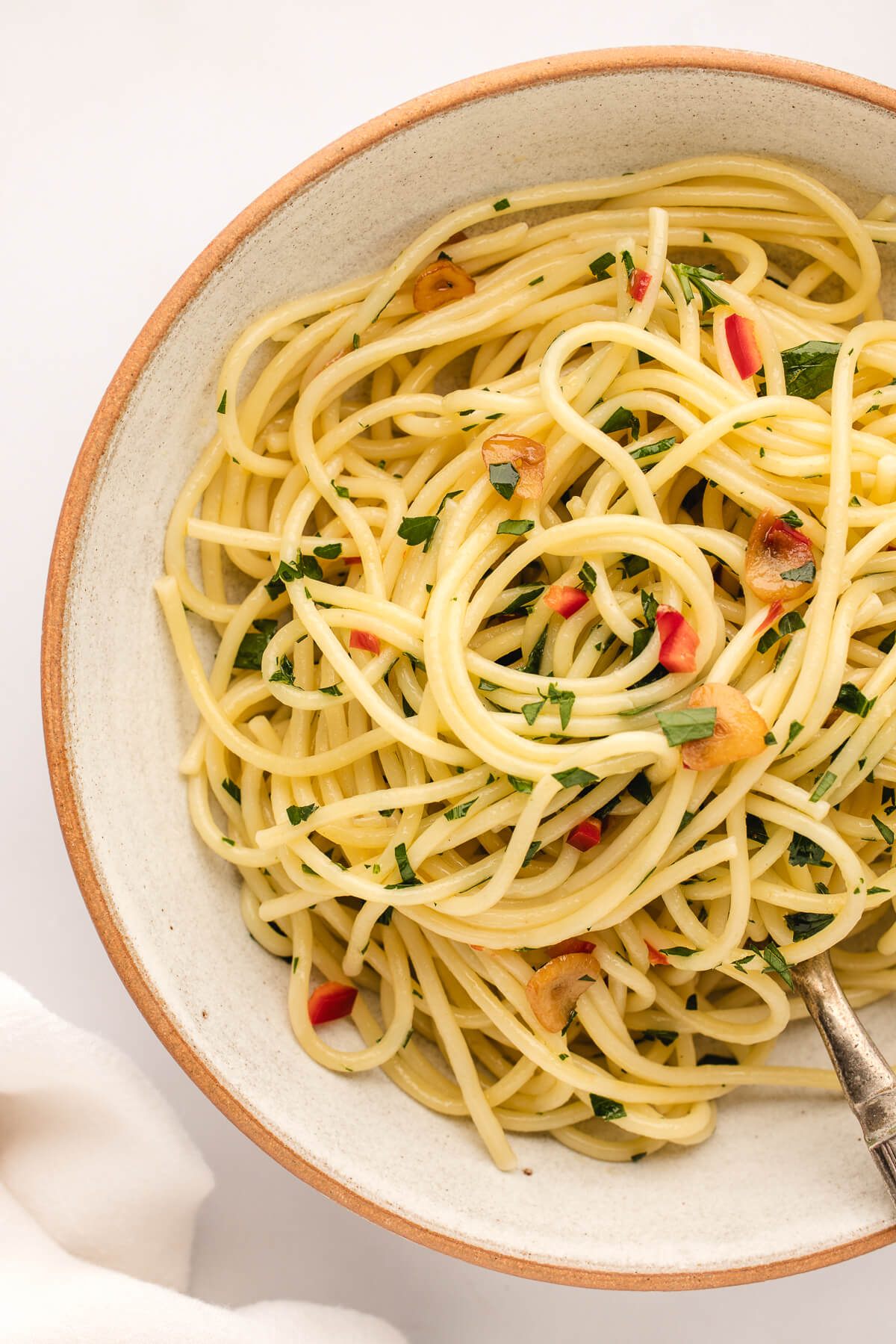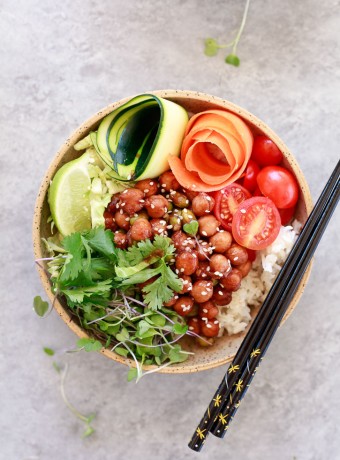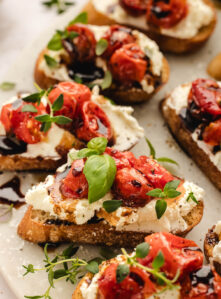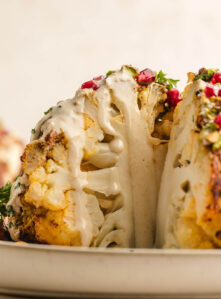Spaghetti Aglio Olio e Peperoncino
Learn how to make Spaghetti Aglio Olio e Peperoncino, an authentic Italian pasta dish that brings the flavors of Naples to your table in under 15 minutes.
What is Spaghetti Aglio e Olio?
Originating from Naples, Spaghetti Aglio Olio e Peperoncino is a prime example of Italian culinary simplicity, embodying the essence of Neapolitan cooking. Similar to San Marzano Tomatoes and Sauce, Pizza Dough, and our Pizza Sauce, this a Neapolitan classic. This authentic Italian pasta dish, prepared in under 15 minutes, features the harmonious pairing of garlic and extra virgin olive oil.
With its roots in Naples, this traditional staple is both popular and easy to make, utilizing inexpensive ingredients with a long shelf life. Like most pasta dishes, this one is usually served as a Primi, or starter, to go along with fish or other main dishes.
Aglio e Olio Translation
Spaghetti Aglio e Olio translates to “spaghetti with garlic and oil.” Peperoncino is the generic Italian name for hot chili peppers and is an optional addition to traditional Pasta Aglio e Olio.
Spaghetti Aglio Olio e Peperoncino Ingredients
Use the best dry spaghetti you can afford and likewise, the best quality extra virgin olive oil is needed here because there are so few ingredients. The “sauce” for this dish is made with just olive oil and pasta water. Using quality ingredients will make this dish sing.
- Dry Spaghetti: The foundation of this dish, providing a satisfying texture that complements the rich flavors of the sauce. You can of course use gluten-free pasta if needed.
- Extra Virgin Olive Oil: The elixir that binds everything together, delivering a robust and fruity essence to the dish. We like to use cold-pressed Italian extra virgin olive oil here for authentic flavor.
- Garlic: Lots of sliced garlic adds a punchy, aromatic flavor that is quintessential to Aglio Olio.
- Peperoncino: Brings a subtle heat that elevates the dish to another level. Choose the right amount based on your spice preference.
- Fresh Parsley: Finely chopped parsley adds a vibrant freshness, balancing the richness of the olive oil and garlic.
- Salt: To taste, enhancing the overall flavor profile of the dish.
What is Peperoncino?
Before making this dish, it’s crucial to understand what Italian Peperoncino is and why it’s distinct from jarred pepperoncini. In the realm of Spaghetti Aglio Olio e Peperoncino, Peperoncino refers to hot chili peppers. It’s the secret ingredient that adds a kick of spice, making this dish more than just garlic and olive oil.
Peperoncino should not be mistaken with Pepperoncini with two “ps”, both are types of chili pepper. One is red and one is green!
Unlike jarred pepperoncini, which are pickled, Italian Peperoncino brings raw heat to the table, contributing to the authentic essence of this classic pasta dish. These are often Calabrian chili peppers, bright red peppers around 2 to 3 inches long.
How to Make This Recipe
Now, let’s dive into the art of creating this dish:
- Cooking the Spaghetti: Follow the package instructions to cook the dry spaghetti to al dente perfection. Remember to reserve a cup of the starchy cooking water before draining.
- Infusing the Olive Oil: In a large, heavy-based pan over low heat, combine extra virgin olive oil, sliced garlic, and chopped chili. Stir frequently to avoid burning the garlic. Once the garlic achieves a pale golden color, remove the pan from heat.
- Combining the Elements: Add the cooked spaghetti directly to the pan, along with about 1/2 cup of the reserved starchy cooking water. Toss the spaghetti in the flavorful sauce, assessing if more liquid is needed.
- Finishing Touch: Sprinkle finely chopped parsley over the dish and toss to combine. Adjust the salt to your taste preference.
- Serve and Enjoy: Your Spaghetti Aglio Olio e Peperoncino is ready to be savored. Serve immediately for the best experience.
 What to Serve Alongside Spaghetti Aglio e Olio:
What to Serve Alongside Spaghetti Aglio e Olio:
As mentioned above, Pasta Aglio e Olio is typically served as Primi, before or with other dishes. Here are some tasty Italian dishes that work well alongside.
Crusty Bread:
– A simple and classic choice, crusty bread or fettunta is perfect for soaking up the delicious olive oil and garlic sauce. It adds a satisfying crunch and complements the pasta beautifully.
Caprese Salad:
– A light and refreshing Caprese salad, with fresh tomatoes, mozzarella cheese, and basil, provides a contrast to the richness of the pasta. The vibrant colors and flavors make it an excellent side dish.
Grilled Vegetables:
– A plate of grilled vegetables, such as zucchini, bell peppers, and cherry tomatoes, brings a burst of freshness and a hint of smokiness to balance the bold flavors of the pasta.
Antipasto Platter:
– Create an antipasto platter with an assortment of olives, artichoke hearts, and cheeses. It adds variety to the meal and allows everyone to customize their bites.
Simple Green Salad:
– A light green salad with arugula, spinach, or mixed greens dressed with a lemon vinaigrette can provide a crisp and palate-cleansing element to balance the richness of the pasta.
Seafood:
– Consider serving grilled shrimp, mussels, or a light fish such as a Branzino alongside the pasta. The delicate flavors of seafood can complement the garlic and chili notes in the spaghetti. If you want to get really fancy, you could even add Uni. This is a great choice for those who prefer a lower-carb option with just a little spaghetti.
Eggplant Parmesan:
– Eggplant Parmesan, with its layers of eggplant, marinara sauce, and melted cheese, adds a hearty and satisfying component to the meal. It’s a flavorful vegetarian option.
Lemon Wedges:
– Provide lemon wedges on the side for a fresh squeeze over the pasta. The citrusy brightness adds a zesty kick that enhances the overall taste.
White Wine or Prosecco:
– Consider serving a chilled glass of white wine or Prosecco to accompany the meal. The crispness of the wine complements the pasta’s flavors.
Storing and Reheating:
If you plan on reheating this dish we recommend reserving a cup of starchy cooking water so that you’ll have some leftovers to re-moisten any leftovers on reheating.
Store leftover pasta in an airtight container in the refrigerator for 3 days. Any reserved cooking water will only be good for 24 hours. Reheat on the stovetop ensuring the spaghetti is piping hot all the way through before re-serving.
Spaghetti Aglio Olio e Peperoncino
Spaghetti Aglio Olio e Peperoncino is an authentic Italian pasta dish from Naples made from every day ingredients in under 15 minutes. Simple yet incredibly delicious, the dish is packed with flavor. This is a great option for a quick and easy weeknight meal.

Ingredients
- 1 pound dry spaghetti (reserve 1 cup cooking water)
- 1/2 cup extra virgin olive oil
- 6 cloves garlic, sliced fairly thick (see notes)
- 1 red chili pepper, deseeded and finely chopped or 1 teaspoon red pepper flakes
- 1/2 cup fresh parsley, finely chopped
- sea salt, to taste
Instructions
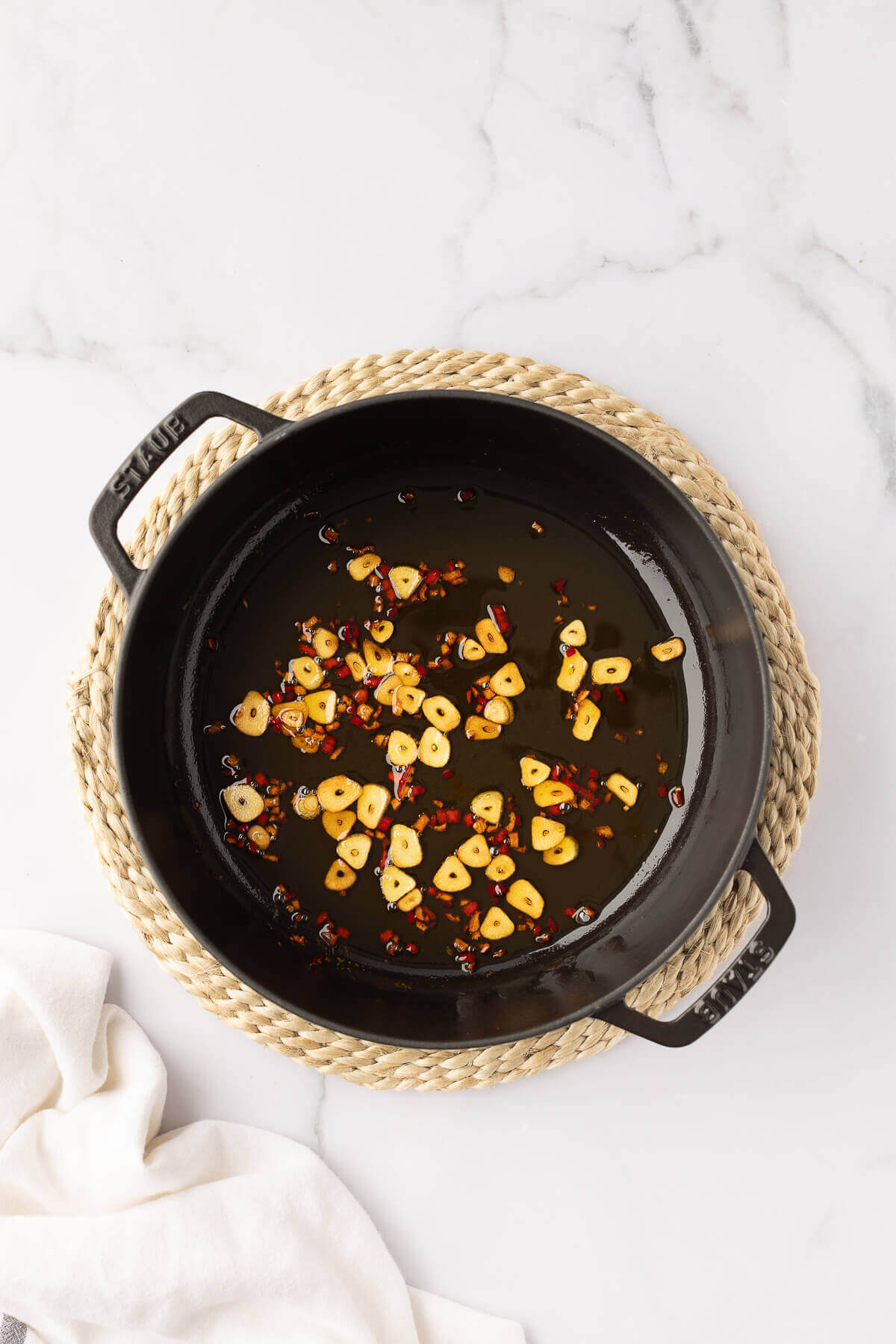

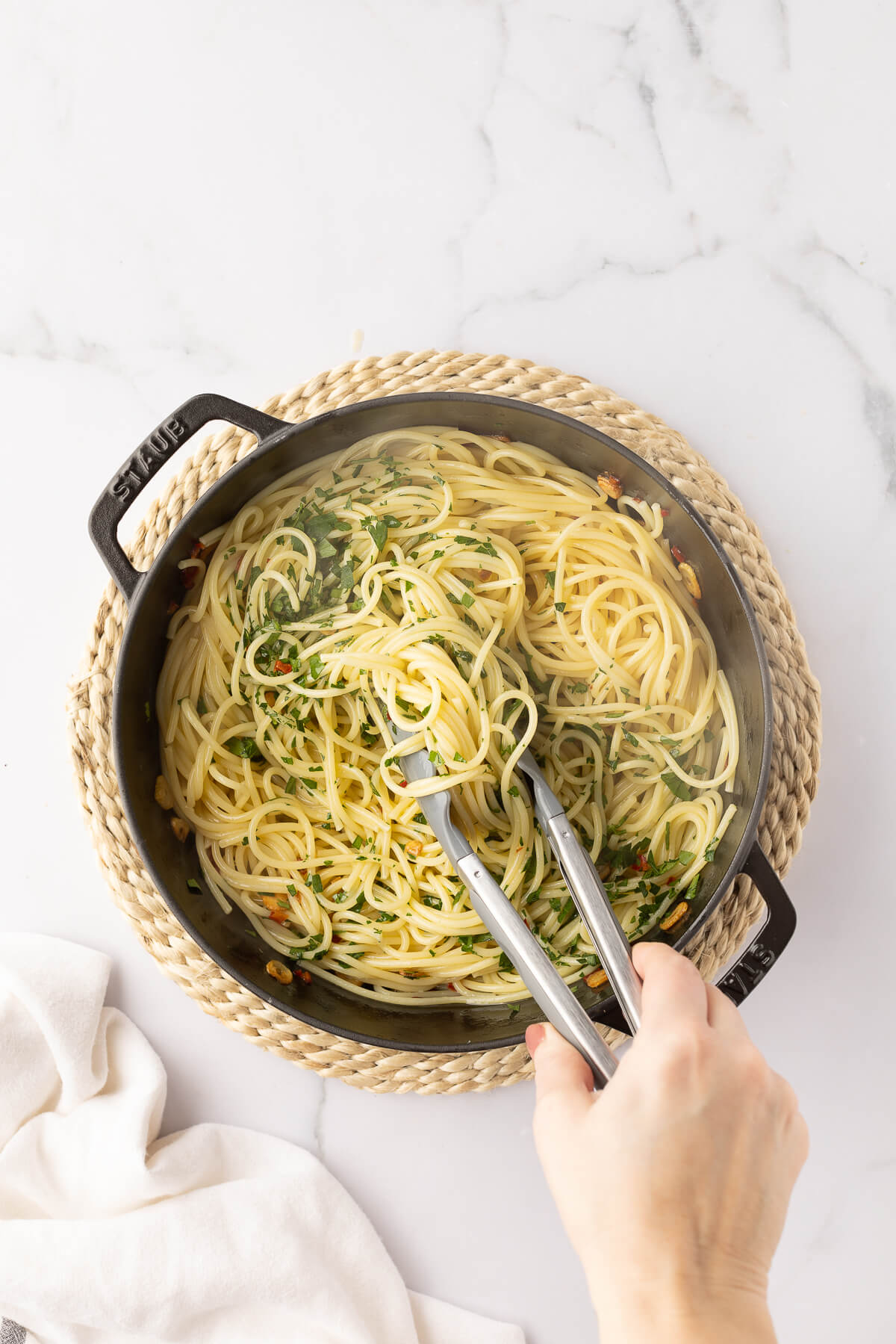
Notes
Garlic
You can make this recipe with varying degrees of garlic flavor. 3 cloves will give a fairly mild garlic flavor, while 6 will give much more of a punchy garlicky taste. We suggest slicing the garlic quite thickly as this will prevent it from burning. It’s very important not to leave the garlic cooking in the oil unattended because if it does burn it will make the entire dish very bitter. If you aren’t a fan of eating large chunks of garlic you can lightly crush whole cloves, add them to the oil then remove them before you add the spaghetti.
Peperoncino Options
If you don't have fresh chili peppers, feel free to use one dried peperoncino or a pinch of dried red pepper flakes. Saute them along with the garlic to infuse into the oil. Add more slowly to taste for more heat.
Cheese
Cheese isn’t included in most authentic recipes however this is lovely served with a scattering of freshly grated parmesan.
Recommended Products
As an Amazon Associate and member of other affiliate programs, I earn from qualifying purchases.
Nutrition Information:
Yield: 6 Serving Size: 1 bowlAmount Per Serving: Calories: 451Total Fat: 19gSaturated Fat: 3gTrans Fat: 0gUnsaturated Fat: 16gCholesterol: 0mgSodium: 106mgCarbohydrates: 59gFiber: 3gSugar: 3gProtein: 10g
Nutrition information is automatically calculated by Nutritionix. I am not a nutritionist and cannot guarantee accuracy. If your health depends on nutrition information, please calculate again with your favorite calculator.


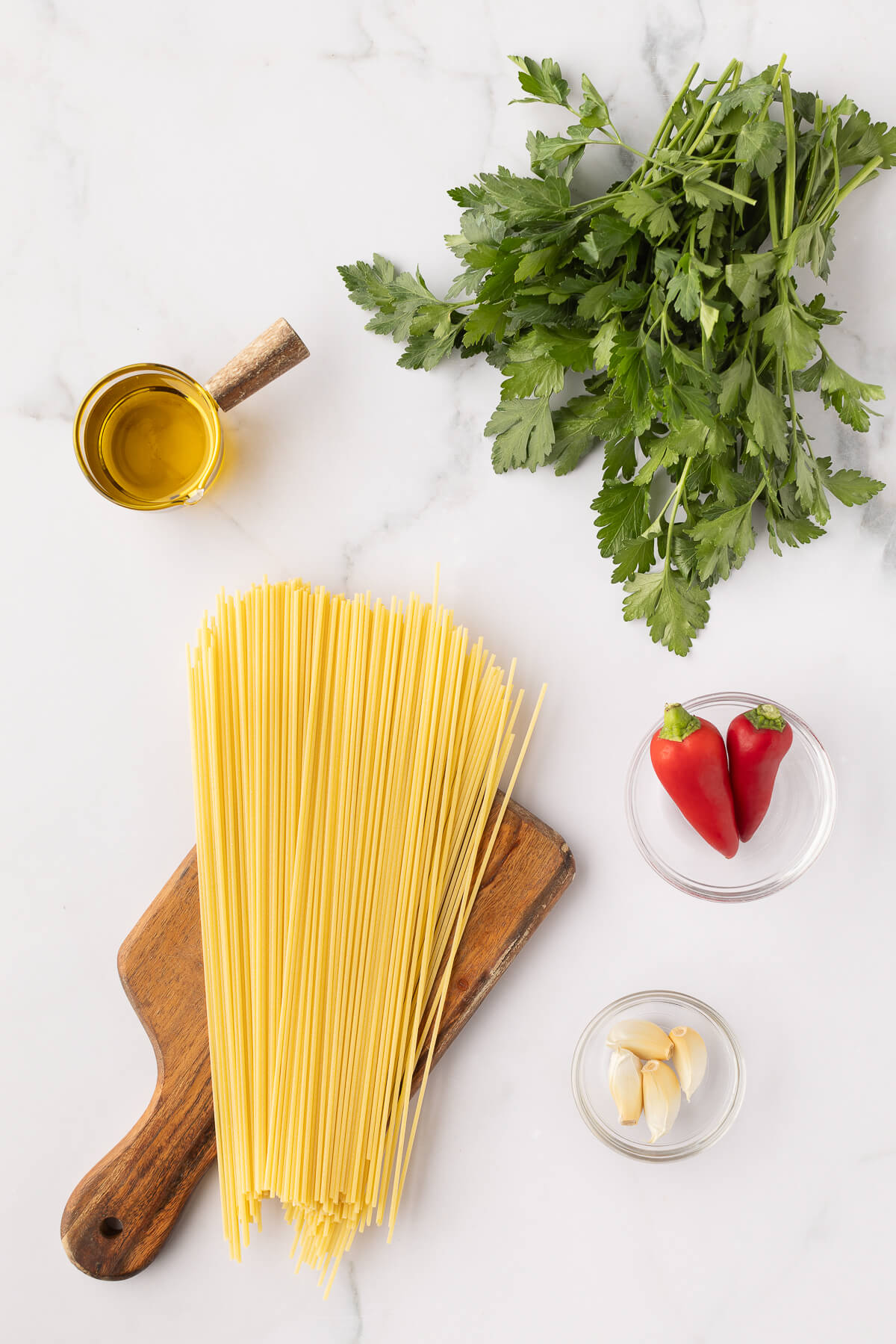
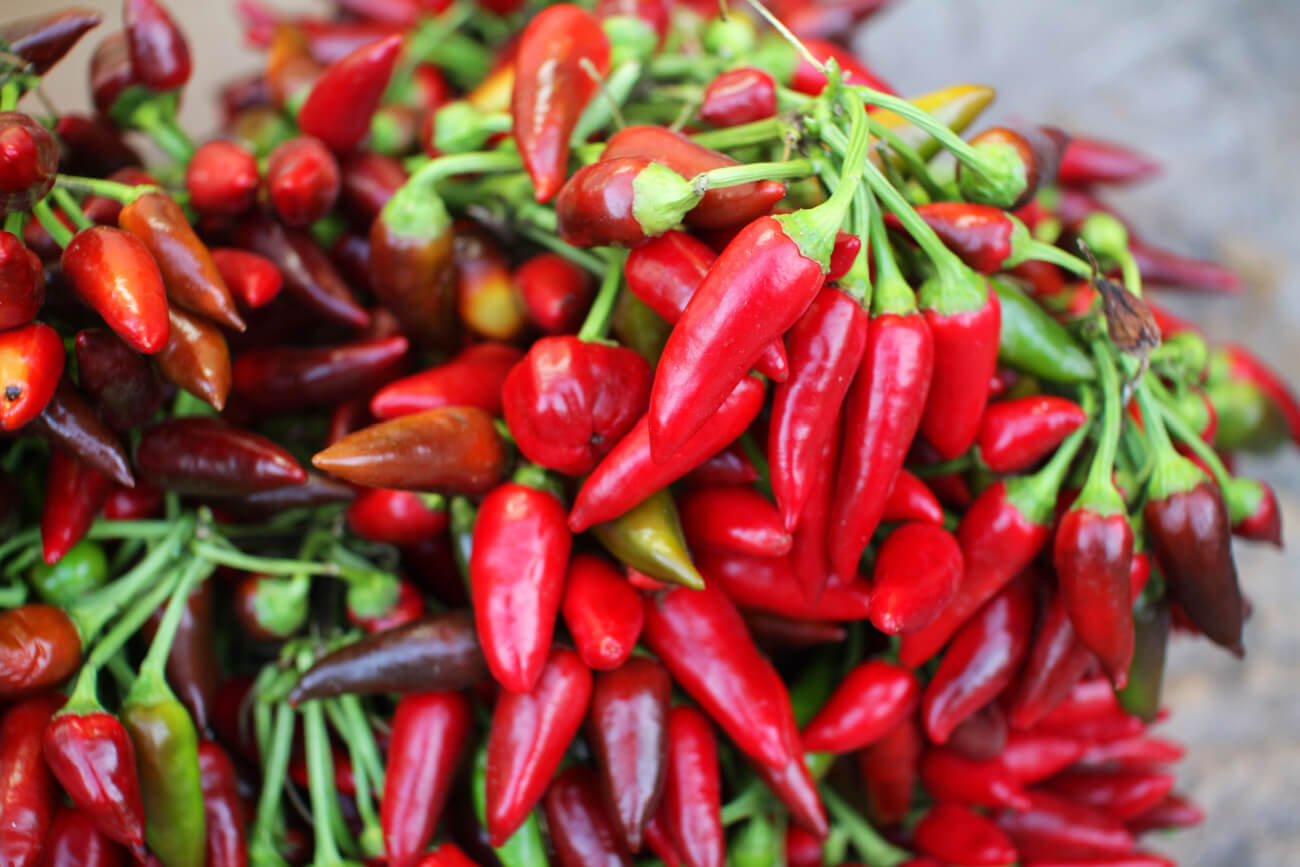
 What to Serve Alongside Spaghetti Aglio e Olio:
What to Serve Alongside Spaghetti Aglio e Olio:
